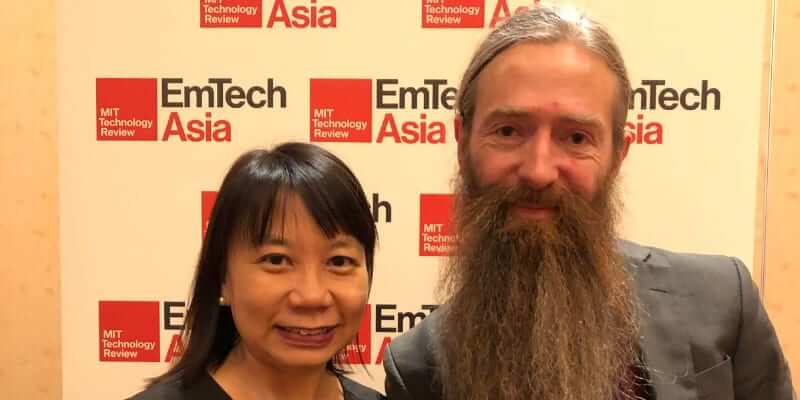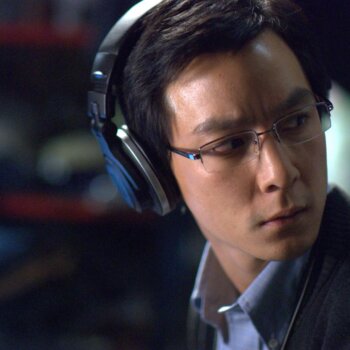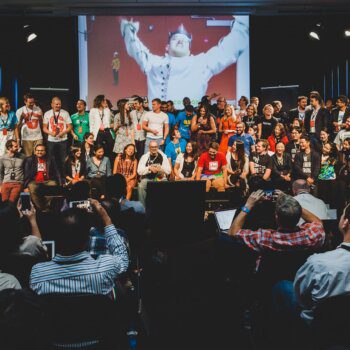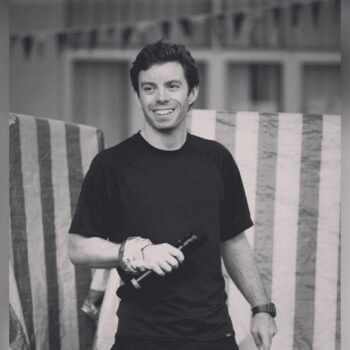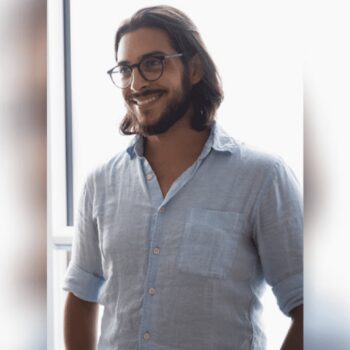I met Aubrey de Grey, Chief Science Officer of the SENS Research Foundation and VP of New Technology Discovery at AgeX Therapeutics, Inc at EmTech Asia where the world’s most influential leaders and innovators driving the next generation of technological breakthroughs gather.
Why did you take on this mission to End Aging?
Essentially most of the answer to that question is, I was in the right place at the right time. I mean yes, I have brought the right qualities, I am a very determined person, I have charisma. I am smart. All the usual necessary things. But I am not like THE world’s smartest person or the world’s most charismatic person. I have an unusual combination of those skills. But at the end of the day, even with all of those combinations of skills, I could not have made any difference for what I have already made or what I hope to make in the future without being in the right place and at the right time. So, I just got lucky.
I found out, in the early 1990s, 25 years ago; this crazy underexplored area, that hardly anybody who had any scientific knowledge to work on aging did. Why they were not doing it was completely nonsensical. So I thought, “Well okay, I better have a go”. I just got into this field at the right time, and I got into it in the right way in a sense that my background within different areas of the work, could be the signs and that gave me a different way of looking it. So that is why it’s me who is tackling this world issue.
Why is the End of Aging so important now?
There are a couple different definitions of “now.” For example ”Why this millennium rather than like a thousand years ago or a thousand years of the future? We have built up enough knowledge of how the body works, of what biology is, that we have a respectable chance of putting that life together into a technological plan. Not actual medicine yet, but closely and nearer to that. In other words a plan for what medicine we can realistically develop in the foreseeable future. That is what we are doing right now. That is why I am a medical researcher. I do not actually work on medicine that already exists, I work on the medicine that could exist soon.
But the other answer is just as important. It is a narrower one, we can say why 2019 rather than 2010? Since 2000, for almost 20 years now, we have had a plan. We have had the thing that I just described in my other answer to why now. In other words, we have figured out a way to put together the things that we already know into a strategy for developing things that we do not yet know how to do; but we could do. In other words, it has moved from being basic exploratory science to being a technological movement. A pioneer in technology. We are segments, really in this is a global movement. There are areas of the world that are doing it more so far but there are others who are catching up.
So why now as in this instance?
Basically, because people have started to listen to me. Ten years ago it was very hard for me to get the message across to people who might be useful, who might have money to invest or influence or resources but did not really understand the science. Yet I have been banging away and banging away, and I am still doing it. People are now finding out I am not wrong. It is beginning to hit home. It is beginning to take root. That is why we are creating this industry now. Even four or five years ago, there was no industry at all. There was no one investing in this, or at least not sensibly. There were few isolated cases where people would think they would wager investing in the anti-aging research area, and they just did not really know what they were doing. Also, the people really investing in did not really know what they were doing. It is all a waste of money, a waste of time. But now it is not like that. Now we have critical mass, and we have an actual coherent plan.
In terms of getting involved, that very much depends on the person. A wealthy person, who might want to get involved a philanthropy or investing, even three-four years ago, were no opportunities, but now there are a million opportunities. The difference between now versus just one year ago is phenomenal. I am the person who is a kind of spiritual leader of this movement a year ago. I still was able to say that I basically knew everybody who mattered. I knew what was going on. I had a finger on things. Now, I totally cannot say that I am totally underwater. It has exploded so fast that there are things happening every week that I just did not know they were happening. It is that good. It is that fast.
What would you say to someone who still used to the thought that we are going to die at a certain age?
I speak to a lot of people all the time. I have a sense of proportion about this. There are some new technologies that I really like. I evaluate them individually. I think the problem many older people have is that they have spent many years being told pessimistic things. So they have been told with “Aging is not like a disease. It is inevitable. It is natural. It is that thing that obviously you cannot do anything about it” until they have made peace with it. When you make peace with something in your future that is really bad, you know that is terrible psychologically.
Psychologically, it is terribly hard to reverse, to re-engage in that battle; That involves becoming emotionally invested in success. That is really difficult because this is pioneer research so we have no idea how long this will take. It may be in time for me. It may be in time for you; it may not. And so one has to generate some kind of robustness, some psychological strength to cope with that uncertainty. I have no problem with that but I sympathize with people who do; with people who just like they prefer to pretend it is impossible or even if they do not want to pretend it is impossible or undesirable. In order that they do not get involved emotionally.
You got to explore why people are so unwilling to be rational about this particular topic.
One should not be thinking about how long ago one was born when making one’s decisions about the present and the future. Rather how valuable it is to live longer should be determined by how healthy you are today and how long you expect to carry on being healthy. Not by how long ago you were born.
Any advice on how to create a movement from your experience?
Aging as a seen issue. Being an embodiment, every movement needs a figure head. Of course, I always need to make sure they don’t take it too far, that I don’t become a guru or a personality cult; but at the same time, I think it is useful that I look distinctive or I am easy to remember.
One thing that is very helpful is that I do not look materialistic. It’s not possible to maintain the idea that I’m in this for personal financial gain, and that is very useful. There is this thing that is called the “anti-aging industry” which is built because it is a big industry. People there make lots of money, but there are things that basically do not work, so I have to distance myself from that. At the same time I have to tell people that we may genuinely be able to completely eliminate aging; which is a very ambitious goal. It is a careful balance that I have to strike and I think I have done it pretty well over the years.
I was talking perfectly happily about longevity as a goal and that’s because I did not realize how people will mishear me; so I had to start really aggressively emphasizing that longevity as the side effect of health. Longevity for health.
I know as this movement grows, I will become less and less necessary. The day I am looking forward to is the day when I can say that I am truly unnecessary and I can just retreat into glorious obscurity and nobody has to get in touch with me and doing interview.
